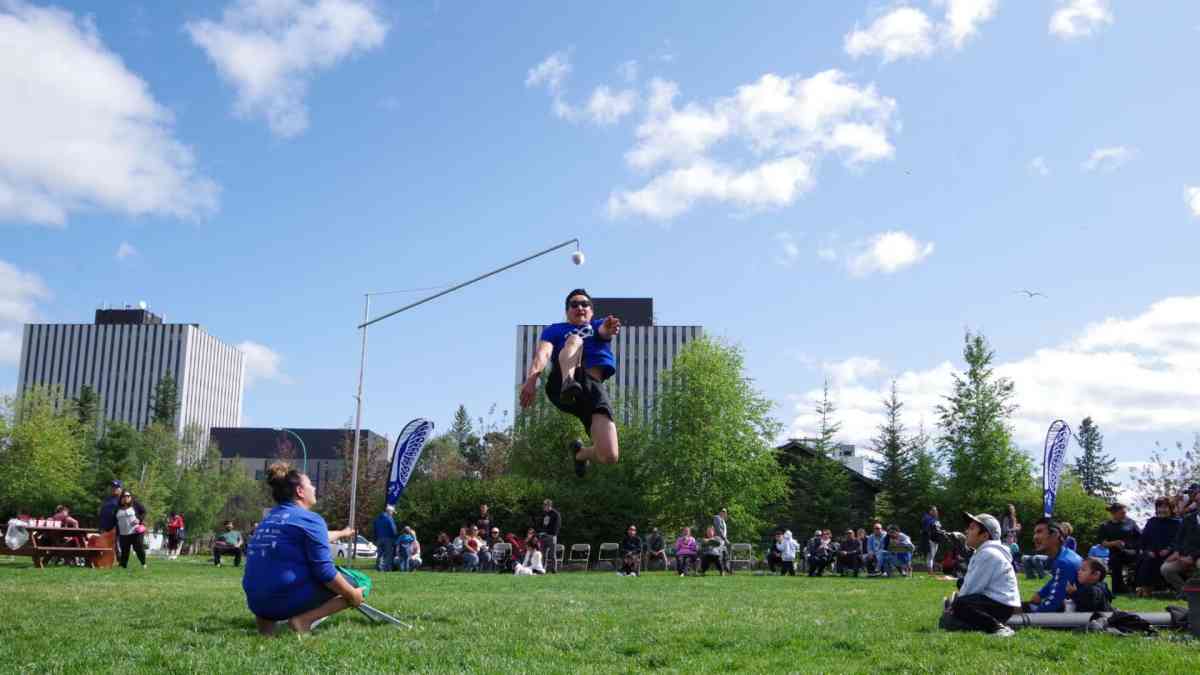If you’ve ever jumped rope as a kid on the playground, it may be hard to imagine it is possible to perform a jump while seated on the ground.
“It was really sore,” Byron Kotokak, originally from Tuktoyaktuk, said after performing a few “bum jumps” during the skipping game. “Especially jumping off the grass. It’s not like a gym. And trying not to slip on the grass, it just takes a lot of muscle tension too.”
Kotokak, together with Aurora Kotokak and her brother James Williams, performed northern games demonstrations at Somba K’e Park on Saturday during a celebration of the signing of the Inuvialuit Final Agreement.
The visit to Yellowknife, as well as Edmonton and Whitehorse, marked the first time this kind of celebration has happened outside the Inivualuit Settlement region – and 35 years since the comprehensive land claim was finalized.
Northern games are both a demonstration of physical ability and a display of pride in their heritage, said James Williams of Inuvik.
“I’m a very proud Inuvialuk and I love my culture. I love demonstrating these games that were passed on to us from our elders and our teachers,” he said.
Aurora Kotokak said children learn by watching their parents perform. “They learn a lot from all of us teaching them and they just love it so far,” she said. “They keep asking us to do it in the living room, just putting our hands up, and asked to go higher and higher. I love passing it on to them.”
Duane Smith, chair and chief executive of the Inuvialuit Regional Corporation, said the travelling events are a way to connect with beneficiaries of the final agreement who live outside the region.
“They are a part of our land-claim agreement and we do every effort to assist them and support them wherever they reside,” he said on Saturday.

James Williams during the skipping game. Emelie Peacock/Cabin Radio

Inuvialuit drummers and dancers performed Saturday at Somba K’e Park. Emelie Peacock/Cabin Radio

Byron Kotokak performs the one arm reach. Emelie Peacock/Cabin Radio

Aurora Kotokak during the Alaskan high kick demonstration. Emelie Peacock/Cabin Radio

James Williams performs a one-foot high kick. Emelie Peacock/Cabin Radio

The one-foot high kick. Emelie Peacock/Cabin Radio

The younger generation of Inuvialuit got a chance to try out northern games at Somba K’e Park on Saturday. Emelie Peacock/Cabin Radio
“We provide programs, supports, education, scholarships, training, counselling,” said Smith. “Whatever is available, we do try to provide it to those beneficiaries wherever they may reside. You don’t have to live in the region to receive all the benefits.”
The relationship between the Inuvialuit outside the settlement region and the leadership at home is not without controversy.
A group calling itself “the 99ers” has been vocal about their inability to elect those who govern them. The region is governed by community corporations whose directors who are voted in by local beneficiaries. The directors from each of the six Inuvialuit regions then elect a chair and chief executive of the Inuvialuit Regional Corporation.
While beneficiaries outside the region are still eligible for benefits, including education assistance and dividend payments, they are not able to vote or participate in community programs.
“It leaves us to feel like second-class citizens,” said Pauline Gordon, a member of Facebook group the Inuvialuit 99ers who also penned a letter to Smith. “I always feel like I’m the poor cousin.”
According to the IRC, there are 2,542 beneficiaries (Inuvialuit over the age of 18 who are enrolled to receive benefits) within settlement region boundaries. The other 2,026 are outside, including an estimated 400 in Yellowknife.
Smith says the IRC is now working on further implementing the final agreement, work he says is never done.
“We’re into the next generation ourselves within our region and outside, so we have to make sure our Inuvialuit, wherever they are, are educated, aware of what the final agreement says and what their rights are,” he said. “But also the different governments, especially the federal government.”








